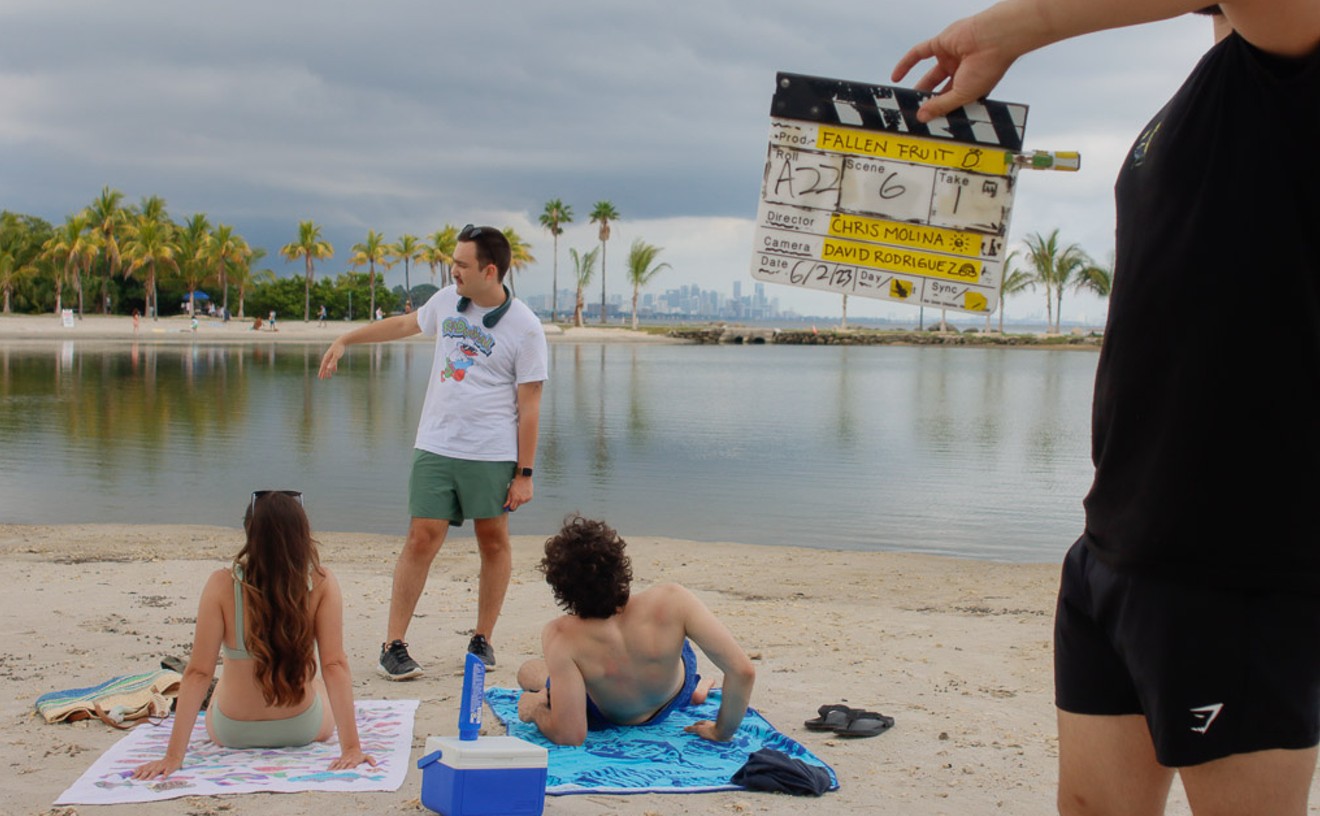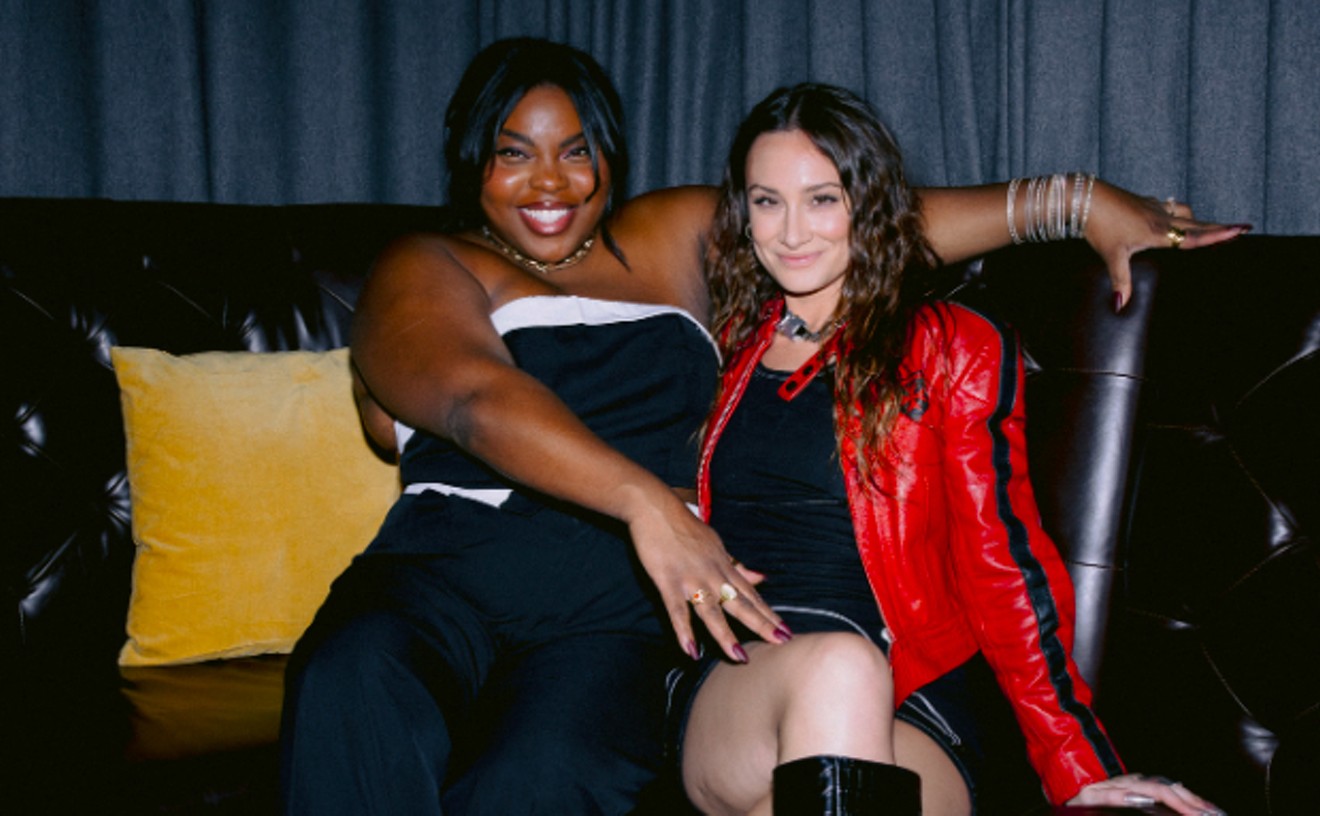What does Coca-Cola have to say about America — the immigrant experience, globalization, progress versus tradition, gods versus science? If this question has never occurred to you, don't worry — it's only barely occurred to Rogelio Martinez, author of "new" Coke caper Fizz, which made its Southeastern premiere at Coral Gables's New Theatre.
In Fizz, Martinez initially seeks an answer, penning a dazzling and bizarre first act before losing his nerve when confronted with some of playwriting's more banal challenges, such as resolution of plot and creation of credible antagonists (to name two that give him particular trouble). In what appears to be minor creative panic, Martinez downgrades the entire venture to a conventional comedy with a big-hearted American moral.
That's a bad thing, but it's certainly not unusual. Daring is hard. Innovation is hard. Just ask Martinez's muse.
In the 1980s, Coca-Cola was an American company past its prime, hemorrhaging market share in the newly competitive universe of soft drinks. For years, Pepsi beat Coke like a gong in blind taste-tests (the famous "Pepsi challenges"), and in 1984 it beat the company in supermarket sales for the first time. Something had to be done. In the late '70s, Coke's board made the odd decision to appoint a foreigner, Cuban-born Roberto Goizueta, as president of the company.
Early in his tenure, Goizueta, a chemist, demonstrated a knack for anticipating public taste by introducing Diet Coke. He sought to do the same with "new" Coke. Coke's improved cola hit stores in 1985 and ran headlong into a tidal wave of public anger so prodigious that, when Coke promised to re-introduce what they now called "Coca-Cola Classic" three months later, a relieved Peter Jennings interrupted ABC's regularly scheduled program to deliver the news to an ornery, thirsty America. Senator David Pryor (D., Arkansas) hailed the announcement from the senate floor.
It was a singularly weird moment in marketing history, one worth revisiting. But was it a farce? Or was it a key to understanding the relationship between the citizenry and its favorite commodities, between sales and sentiment? Or both?
At the beginning of Fizz — which was probably named after Roberto Goizueta's Welsh corgi — the audience is cast as immigrants at a citizenship ceremony. We are addressed by Roberto Goizueta (Carlos Orizondo), who wants to tell us the story of his own internal enfranchisement as an American. In quick, impressionistic scenes we see him rise — from humble chemist with an impenetrable accent applying for a job at Coke's Cuban bottling plant — to science-geek-for-hire at the company's laboratories in just a few years. And then he is addressing a horde of on-screen journalists — stretched across the stage as a tableaux of rictus grins and angular limbs — as president of America's most famous company. Explaining the new and improved Coca-Cola he says, "It's rounder. More harmonious tasting." He believes it. The journos do not.
They didn't believe it in 1985, either, but this is where Fizz parts ways with reality. In the play, Roberto Goizueta is accosted in Grant Park by a southern belle with psych issues named Trixie, who makes him taste her Coke-infused peach cobbler — ruined, she says, by Coke's new formula. Then she menaces Goizueta with a gun. Nevertheless, the pair become friends. Inspired by Trixie's love for old Coke, Roberto sets out to discover what real Americans think about soft drinks. He descends into the cocaine den of a horny Rockette (played by Tara Vodihn in a deliciously stylized, plasticene performance). He accosts a redneck in a supermarket (Francesca Toledo, who packs more sleaze into three minutes than a Ke$ha single). All the while, Goizueta's steps are dogged by nefarious Pepsi reps who wish to capitalize on Coke's losses, especially in the American South where Coke's introduction of a new formula is treated as an event on par with the surrender of Robert E. Lee.
The Pepsi subplot is responsible for Fizz's ultimate turn to the banal, but it's impossible to oversell the crazy, smart, manic fun that precedes it. Carlos Orizondo, along with Bill Schwartz (who plays Goizueta's number two, a character loosely based on Donald R. Keogh), serve as charming, sturdy straight-men, flabbergasted by the American spectacle parading across the stage. Schwartz switches characters often — as do Toledo, Vodihn, Shavonn, Ozzie Quintana, Andrew Wind, and Scott Souglas Wilson. Together, the ensemble brings to life a whole zoo of characters, presented with a broad intensity that seems equal parts sketch-comedy and, weird as it sounds, modern dance. They're having a lot of fun with this show, and it shows. Vodihn's coked-out Rockette is un-bucking-felievable — we laugh so hard, and for so long, we almost drown out the next scene. And Andrew Wind's two-minute performance as an actor playing a deranged Southern Coke-drinker for a Pepsi commercial literally stops the show when the audience doesn't stop applauding.
Fizz is that kind of production. You've bought a ticket, and now you're somehow part of the product. You feel a kind of ownership — a freedom to yell at the stage, or stop the action, should you be moved to do so. This is apparently how America feels about Coke, too, and I wonder if the similarity is intentional.
Two people from Fizz stick in this writer's brain more than anyone else. The first is director Ricky J. Martinez. In a video interlude early in the play, he portrays both a redneck and druggie (who looks remarkably like Slash, the guitarist). He's fabulous, and I'd like him to act more. Martinez's talents as director are considerable — especially in a play like this one, which relies on whizz-bang showpieces rather than sustained mood-building — but he shouldn't limit himself.
The second is Aubrey Shavonn. I was annoyed by her performance in In Development last year, and I now assign blame entirely to that show's turgid script. Here, she glitters. She is an object of vivacious hilarity when she's a wronged, gun-toting Coke fan. She also projects a sweet, subtle pathos in her quieter moments, showing Roberto Goizueta the little museum of Coke memorabilia she keeps in her trailer — a shrine to an imaginary world where time and America stand still, leaving no one behind.










